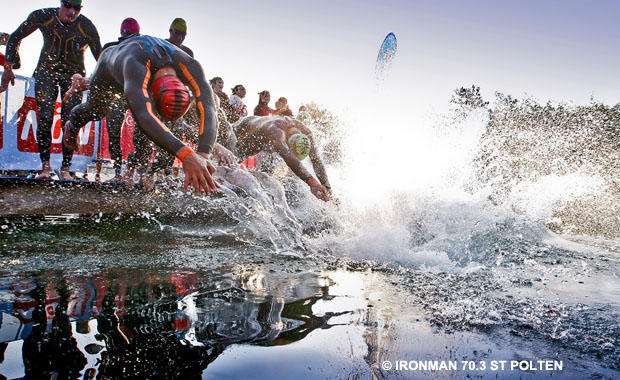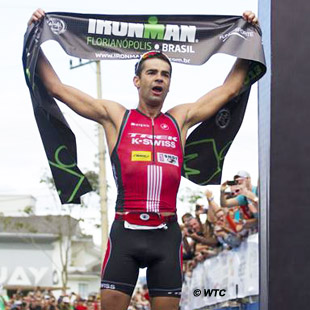It was a bittersweet victory
Canadian Pro Sara Gross finally captured her first Ironman title in Brazil, but what should have been a happy memory turned out to be bittersweet indeed.
Immediately after the popular Ironman event in Florianopolis, Brazil various athletes who raced there had reported massive pelotons on relatively narrow bike segments, and over the weekend a flurry of videos and pictures showed up on Twitter, Instagram and our reader forum. Many athletes were called out by name and among them was the female race champion Sara Gross.
Brazil is a venue where age groupers start with the Pros and that means Pro females are surrounded by age group males most of the day, and usually not by their choice. We checked in with Sara Gross to get her perspective on what transpired in Florianopolis.
Slowtwitch: Hi there Sara.
Sara Gross: Hi Herbert!
ST: Congrats on that win in Brazil.
Sara: Thank you. A lot of blood sweat and tears goes into winning an Ironman race. It was a special day for me and my family.
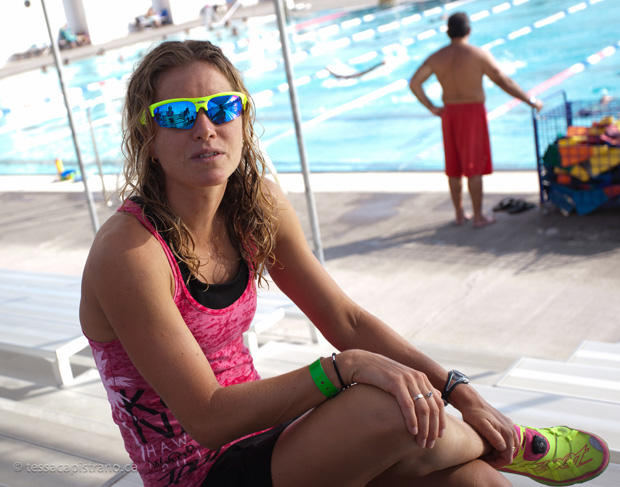
ST: I believe this was your first Ironman title.
Sara: It was! I’ve finished second three times and have collected 16 Top-5 finishes but had never won. That’s partially what kept me going after my daughter was born. The second place finishes made me believe that I could do it, so I just kept plugging away, trying to figure out how to get the best out of myself. The journey had its ups and downs, but it’s worth it. Not just because I finally got to feel what it was like to win, but because the journey has taught me a lot about what’s really important in life. I know that sounds a little heavy, but its true.
ST: Talking about heavy, our twitter feed and forum has been barraged with pictures and videos from various draft packs at Ironman Brazil, and you are featured too. But I guess you did not need a video.
Sara: Yes, the drafting was pretty bad this year in Brazil. I have raced there 6 times so I knew what to expect. As a pro woman you are pretty much surrounded by age group men all day long. And this doesn’t just happen in Brazil. I have seen it in Europe, Australia and North America. Some races are worse than others.
ST: No head start for the Pros in Brazil. Is that true?
Sara: The pros have never had a head start in Brazil. I don’t really know why this is. The race organizers do a great job on so many levels, but this is a mistake.
ST: But why do you then return over and over to the same race when this issue is reoccurring?
Sara: Good question. Every year I ask myself this same question. This year, I actually decided to race IM Texas instead so that my husband and coach could travel with me and because I knew it would be a cleaner race. I really wanted to have the kind of race where you put your head down and hold the best watts you can for 112 miles. I had trained for this kind of consistent riding. The decision to go to Brazil came later when I decided to double up.
And of course, Ironman Brazil is a wonderful race for many other reasons. I love traveling with Ken and his group at Endurance Sport Travel. It’s the only race I do each year where I am really taken care of. It makes for an easy, stress-free race prep. Florianopolis is a pretty place, the climate is moderate for someone who does the majority of her training in Canada, and the Brazilians are sports-mad so the fans are fantastic.
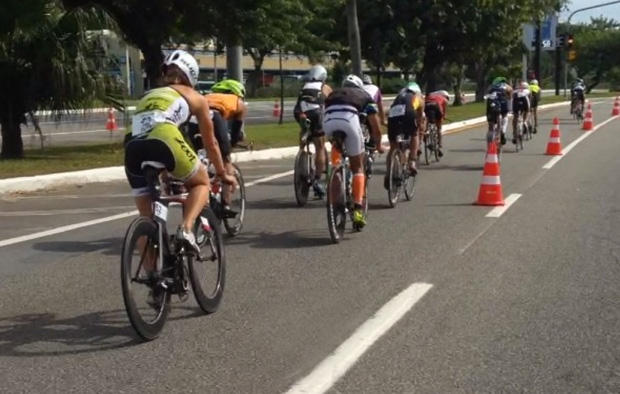
ST: So you were basically near age group men and some women for most of the race, starting with the swim.
Sara: Absolutely. One of the main challenges is that there are so many super-fit age group men! This should actually be a good thing, but the result is that you have a lot of people of similar fitness levels out there in the same space of water and road. The first time I raced there in 2007 I got pummeled in the swim so badly that I actually thought I might drown.
ST: I think on your blog you described it being especially bad during the final 30k on the bike. Did you have much more room earlier?
Sara: Yes. Earlier in the ride things were a bit more spread out. There was enough room to work with other people while keeping reasonable gaps, to overtake and be overtaken. There are still a lot of people around, but it wasn’t as bad.
ST: In one clip I saw it seemed that you were looking hard for a spot to go past the group, but it appeared too narrow of a segment. Where on the course was that and had that group caught you earlier?
Sara: This clip was fairly late in the race, maybe 140kms or so? That’s a rough estimate. I was trying to overtake at the time and couldn’t get through. My legs only came around late in the ride, so I was feeling good and wanted to go! I wish I could tell you if those guys had already caught me and overtaken. There are just so many people around, it is hard to tell who’s who.
ST: How long were you stuck in that position?
Sara: I can’t remember exactly, but I do remember the frustration. I had to reign in my emotions pretty quickly, because I knew that otherwise it would ruin my race. I do remember the road widening at certain points and I would sneak past a few guys, and then it would get narrow again and repeat.
ST: Many men seem to not let women ride past them, without having a go to get back ahead. Is that something you experience?
Sara: Haha! Of course. And that is only one of the complicating factors out there. When people think it is just a matter of sitting up and letting the men pass, they are a little naïve. Men pass you too fast and then slow down immediately. Then you have the guys who go out way too hard on the swim or the bike and you have to pass them back again later in the ride. This is what created the situation where I was overtaking a number of men in the last 60km of the ride… at least I was until the whole road was blocked up by a massive group.
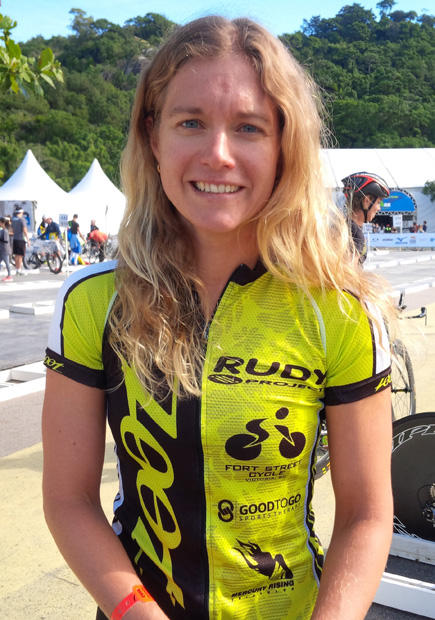
Imagine a situation where you are overtaking someone who, as you are going by, instead of dropping back, they speed up. And at the same time there is another guy overtaking you, all in a single lane. So now you have to choose whether to gun it to overtake the first guy and if you do you are basically on the wheel of the other guy who is slowly passing on your left. Or you sit up and drop back again and risk a penalty for an incomplete pass. And while all this is happening, there you are, surrounded by men who are completely blocking you from the side wind and you are in fact drafting in the basic definition of the word. And this is only one of 100 scenarios that can arise. The race becomes a series of ethical decisions about how to react to the men’s race around us.
ST: Many female friends of mine have experienced the men not letting women ride faster on simple regular training rides.
Sara: Oh my god – yes! I can’t even ride to the pool without a dude on a commuter bike with panniers trying to show me how fast he can ride.
ST: Your blog entry was not posted until today, basically a day after we saw all these videos show up on twitter and our forum. Did you feel you had to respond?
Sara: I really wanted to respond to every negative comment I read, but had to stop myself. The worst thing that can happen in a situation like this is if people get angry and start pointing the finger. I think for the most part, we are all just trying to make the best decisions we can at the time. I also think it would be wrong to blame the race organizers or the marshals. Rules about the timing of our race start and how the officiating is conducted should be uniform across all Ironman races.
I actually wrote that blog a couple days ago and was waiting for pictures from a photographer friend before posting. I think the photos were worth the wait!
ST: Other Pro females had also complained about the drafting and I believe Lucie Reed was especially vocal right after the race. But she got a 10 minute drafting penalty.
Sara: I made a decision before the race to focus on myself and not get caught up in what other people were doing. As a result, I really have very little idea what other people were doing out there. In the first couple out-and-back sections I tried to look around for the other women, but sometimes it is hard to tell the men from the women on the bike, so I gave up!
I only saw Lucie briefly during the race, but from what she told me after, it sounded completely unfair. I think Lucie’s story is case and point that when these huge packs have formed, there is a certain period of time when you are completely caught up in it. I have no doubt that she did her utmost to ride fairly and yet found herself in a compromising position. She did not deserve that penalty.
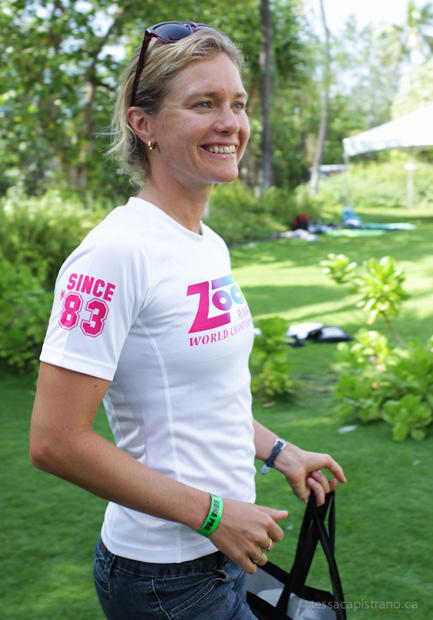
ST: What about Sofie Goos, Ana Lidia Borba and other females?
Sara: Ana and I rode together for most of the ride, so I know she was making an effort to play fair. I only saw Sofie right near the end and we shared a short commiseration about how out-of-control the pack had become. For the most part, I saw women who, like me, had to make constant decisions about how to ride in relation to the many men around us. I think most of us try to be as fair as possible, but without giving up our own race. If we constantly sit up and let people pass, we will go backwards. I don’t think we should be put in that position in the first place. A few simple changes would help a lot.
I know that no matter what I say, there’s going to be people who continue to judge myself and the other Pro women harshly. But I think this is a systemic problem and should be addressed as such.
ST: Was that the worst you had seen or do you consider that are common issue?
Sara: I’ve been racing as a pro for 10 years, so I’ve seen a lot. I don’t know if this was the worst, but it was pretty bad.
ST: A big issue with the drafting topic is that apparently no one thinks that they deserve a penalty or that they drafted. Most people would seemingly rather admit theft and adultery.
Sara: Yes! This is because most of the women are truly trying to play fair. They are speaking from the place of intention. We don’t want to sit up, slow down and give our race away to a bunch of age group men. And this is where problems arise.
ST: I actually meant competitors in general, not just women. I do not know any athletes who have admitted to drafting, including those who I have witnessed personally doing so.
Sara: Right. I got your meaning now. And I agree that no one will ever admit to drafting. I think this is because there is a huge grey area here. For example, if a competitor passes you and they are a couple percent faster than you, it would be foolish not to use that person to pace off, while keeping a legal distance. We all talk about riding with other people or about the main group or the chase group even in an Ironman race. And what we mean by that is cyclists who are working together at a legal distance. Then you get into a grey zone where the judgment of what a legal distance is comes down to the competitors and the marshals. And most people will judge themselves to be 10 meters back or 7 meters back even if the reality is 9m or 6m or worse.
Then you have the much rarer situation of the person who intends to cheat by jumping on a wheel and staying close to that wheel as long they can until they hear or see an official and then they drop back. This happens and of course those people are true cheaters and thus would never admit it anyway. The first situation is an error in judgment that I think most of us make from time to time and the other is a character flaw.
ST: I actually think the latter is more common than you think, but let us move on. So what do you consider the minimum head start Pro females should have over age groupers?
Sara: That depends on the race. Two weeks ago I raced at IM Texas and we had a 15min head start. I hardly saw any age groupers on the ride until about 90 miles. From what I saw, it was a pretty fair race. At races where there is a higher percentage of very fit men, like in Kona, the gap should be bigger.
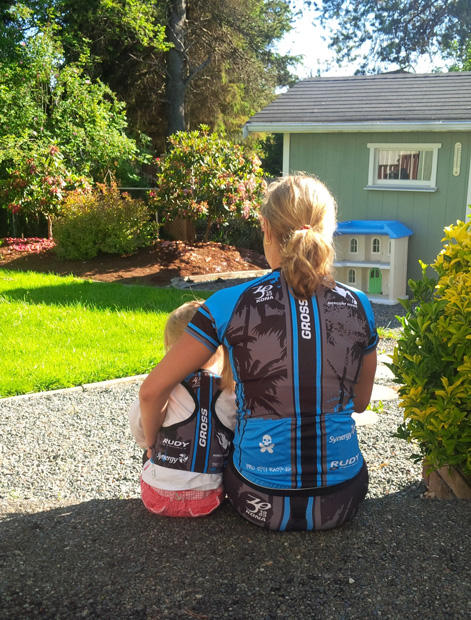
ST: So what is next for you?
Sara: You know, the win hasn’t even sunk in yet. It took me so long to get it, I think I’m still a little shocked that it finally happened. I really want to do some of the great Canadian races over the summer, like Mont Tremblant, the 70.3 and/or the IM, and Calgary 70.3 or the Ironman in Whistler. There are a lot of great choices close to home where I can take my daughter, visit family and race all at once!
ST: Well, we wish you a great summer.
Sara: Thank you Herbert! Same to you.
The second image is a screenshot from one of the videos that was sent to us via twitter



